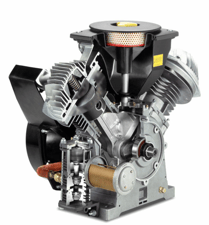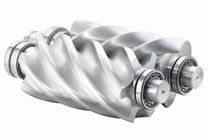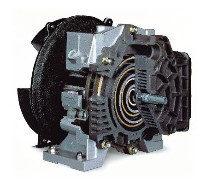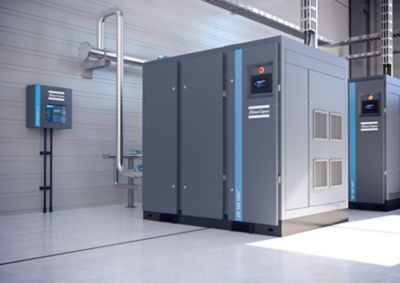Estimated reading time: 3 minutes
If you are faced with the purchase decision for your compressed air supply, you should beware of the 5 biggest mistakes that you can make when choosing an industrial compressor. In this post you will learn how to avoid the mistakes and find the optimal product for your application.
1. Wrong technology: screw or piston compressor
Whether piston, screw or scroll - every compressor technology has its right to exist. We explain the different compressor technologies:
Advantages and disadvantages of reciprocating compressor technology:

The piston technology is primarily used in compact, portable compressors, for example in workshops and petrol stations, but also to support main engines for starting ships. They take up little space, are easy to use and robust.
Advantages and disadvantages of screw compressor technology

The screw technology is ideal for small and medium-sized companies. The screw compressor technology enables a 100% duty cycle, offers particularly low energy consumption and high efficiency. Unlike reciprocating compressors, whose energy consumption increases over time, screw compressors maintain their high efficiency. The screw technology also enables particularly low-vibration, low-noise operation.
Use of scroll compressor technology

The scroll technology is primarily suitable for industrial applications in research and development laboratories, hospitals, universities, dentistry, as well as the food and beverage industry, because they provide 100% oil-free compressed air. Thanks to the low speed of the compressor elements, scroll compressors run extremely quietly and are therefore suitable for installation in any work environment. Scroll compressors are suitable for applications where flexibility and energy efficiency are a priority. The scroll technology enables the volume flow to be optimally adjusted when the air volume requirements vary. Scroll compressors have a small number of moving parts, which ensures a long service life and low maintenance.
Is the smoothness particularly important? Or does maximum energy efficiency play the most important role? Would you rather be small, compact and mobile, or stationary? There is a solution for almost every individual requirement. Therefore, before making a decision, you should always carefully consider the advantages and disadvantages of the different technologies and weigh them up.
Everything about compressor technologies such as piston compressors, oil-free piston compressors, diaphragm compressors, screw compressors, oil-free screw compressors, liquid-cooled screw compressors, rotary tooth compressors, scroll compressors, rotary compressors, liquid ring compressors, blowers, turbo compressors, radial and axial turbo compressors can be found in the manual for compressed air technology
2. Wrong size of compressor
It is not only important to know the amount of air required at the moment, but also a realistic view of the future definitely helps to choose the right compressor. For example, if the compressor is too small, it will quickly reach its limits and experience shows that this ends with overloading of components - a car that is constantly driven at full throttle and maximum speed is due for the workshop after a short time. In addition, the compressor can certainly not cover a future additional demand for compressed air. From a commercial point of view, the "profit" from low acquisition costs then makes no sense - on the contrary: the total costs are significantly higher in the end through the replacement / supplementary acquisition than a solution that fits in advance.
A compressor that is too large costs money unnecessarily - in terms of acquisition and operating costs. In addition, it also takes up too much valuable floor space in the company. But how do you determine the optimal size, i.e. performance? The clarification of the following questions helps here:
What operating pressure do I need for my compressed air consumers? An excessively high operating pressure causes unnecessary energy costs. An operating pressure that is too low will reduce the performance of tools or possibly lead to malfunctions.
What is the maximum compressed air volume flow do I need? If you cannot fall back on empirical values (e.g. the performance of existing compressors), we recommend that you seek advice from an experienced expert. If the selected compressor is too large and has too high a proportion of idling, the efficiency is reduced. If the compressor is too small, the pressure drops. Compressors with variable-speed drives (VSD) cover a large volume flow range and respond to the current demand for compressed air. This means that only as much compressed air is generated as is required.
3. Wrong compressed air quality in compressors
The standard industrial compressor is usually an oil-lubricated screw compressor. This means that the air produced contains oil and in most cases has to be filtered. This is completely sufficient in many areas of application. There are efficient, highly effective filter systems that also meet high quality requirements for compressed air and reliably filter out oil and other unwanted particles. However, it is important to check the filter systems for function regularly, as there is a residual risk, because filters can also fail for various reasons, such as poor maintenance, unexpected saturation of the filter media, etc. However, there are areas of application that are only absolutely oil-free in the compressed Require air ( according to class 0 ) and where this residual risk of oil contaminated air is unacceptable.
In these cases, an oil-free compressor should be used, the compressor unit of which works oil-free, the compressed air does not come into contact with oil or lubricants in any situation. Oil-free air is absolutely essential in the food and beverage industry, paper and printing industry, pharmaceutical industry and wastewater treatment. Even traces of oil contamination can extremely damage or destroy the product quality and lead to production plant failures.
4. Service and spare parts supply for the compressed air system is not guaranteed
Who buys a car where the supply of spare parts is problematic and there is a lack of specialist workshops (unless it is about vintage cars and enthusiast vehicles)? We all know that technical devices don't last forever - there comes a time when components are worn out.
Therefore, the question is not "if" but "when". In most cases it is worth replacing worn parts and extending the life of the compressor through the overhaul. The procurement of spare parts is not a problem for branded products - even when it comes to older devices. Professional repairs by the manufacturer's service organization or in a specialist workshop are also usually not an issue. Caution is advised when buying online and brands that are not represented in Canada. It often becomes difficult with the supply of spare parts and repairs. In the worst case, the device can no longer be operated and ends up in the scrap metal. In such cases, investing in a cheap device was not economically viable. Well-known manufacturers have a close-knit Dealer and service network, "google" usually helps to find out where the nearest service point is.
5. Underestimate the lifecycle costs of compressed air systems
The lifecycle costs, for example the costs that arise during the product life cycle, such as costs for energy, maintenance and repairs and depreciation are well above the cost of a compressor. The energy costs to generate the compressed air required can amount to up to 80% of the lifecycle costs. Therefore, the energy efficiency of a compressor is extremely important. Maintenance and repair costs are often negligible if there is a functioning supply of spare parts and repair options for the device. Of course, the depreciation is important when considering a residual value at time X at which the compressor is to be traded in for a new device.

